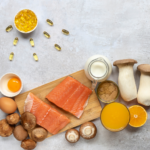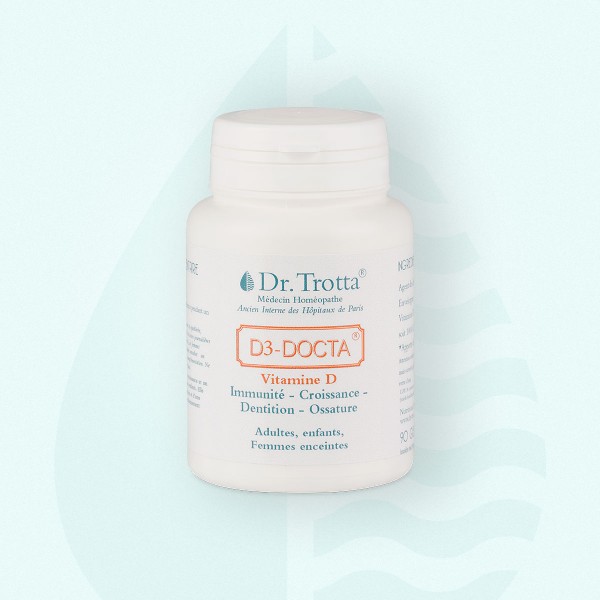What are the benefits of Vitamin D?

What is a vitamin?
The term vitamin comes from the Latin“vita“: life, and“amine“: an organic compound. Vitamins are biological substances essential to life, which the body cannot synthesize. It must therefore be supplied to the body externally.
There are 13 types of vitamin that play an essential role in our bodies: the B vitamins (B1, B2, B3, B5, B6, B8, B9, B12), vitamin C, and vitamins A, D, E and K.
What is vitamin D used for?
Vitamin D is mainly used to :
- enrich your skeleton and teeth in minerals (calcium and phosphorus). It is the essential mineralizing vitamin.
- protect your intestinal mucosa from pathogenic bacteria: by the secretion of antimicrobial lysosymes by the paneth cells, located at the bottom of the intestinal crypts. Oral vitamin D thus helps keep the intestinal mucosa selectively impermeable.
Vitamin D also strengthens the tight junctions between intestinal cells (enterocytes). By preventing and treating intestinal hyperpermeability, vitamin D thus has a preventive and curative action on the cause of modern diseases (autoimmune, degenerative). - Stimulate your immune system: vitamin D has a strong antiviral action. Faced with a viral infection, macrophages produce vitamin D receptors. If your vitamin D reserves are sufficient, it binds to macrophages, which then produce defensins and cathelicidins that destroy the viruses at the root of the infection.
- Vitamin D has an anti-inflammatory action: it lowers pro-inflammatory cytokines and increases anti-inflammatory cytokines.
- Vitamin D reduces the incidence (risk) of cancer, particularly colon and breast cancer.

What foods are rich in vitamin D?
Vitamin D is found mainly in fish: sardines, mackerel, cod liver oil, trout, swordfish, salmon.
It is also found in eggs, dark chocolate and mushrooms.
Why are we vitamin D deficient?
Without realizing it, a considerable number of people are vitamin D deficient, since most foods are low in vitamin D, and few people eat foods containing it on a daily basis (sardines, mackerel, cod liver oil, etc.).
Vitamin D is also synthesized by the action of sunlight captured by our skin. However, we are only exposed to these rays for 2 to 3 months a year, which explains why we are often vitamin D deficient during the autumn and winter seasons.
According to the French Academy of Medicine, 80% of French people are vitamin D deficient. Since 2012, it has therefore been recommending a daily intake of 800 to 1000 international units (IU).
The most vitamin D-deficient people are :
- the elderly: the aged skin of people over 70 synthesizes four times less vitamin D than that of younger people;
- pregnant and breast-feeding women,
- people who are sedentary or work indoors, with little exposure to the sun;
- people living in northern or less sunny regions;
- most Westerners in winter (due to reduced UVB radiation) and air pollution.
Vitamin D supplementation, particularly in autumn and winter, can be particularly beneficial. Laboratoire Nutritional Dr Trotta offers you a dietary supplement for everyday use: D3-DOCTA, easily assimilated and bioavailable vitamin D.
One 10 mg capsule of D3-DOCTA provides 1000 IU of Vitamin D, which is the reasonably recommended daily dose (500% of RDA). This dose is a fair balance between the official RDA of 200 IU and the massive single-dose quarterly ampoule of 200,000 IU, which is excessive. In other words, it’s better to take a sufficient daily dose (1000 IU/d).
Nos produits naturels
Need more information and to meet Dr. Pascal Trotta?
Make an appointmentAlso read

Spring allergies

